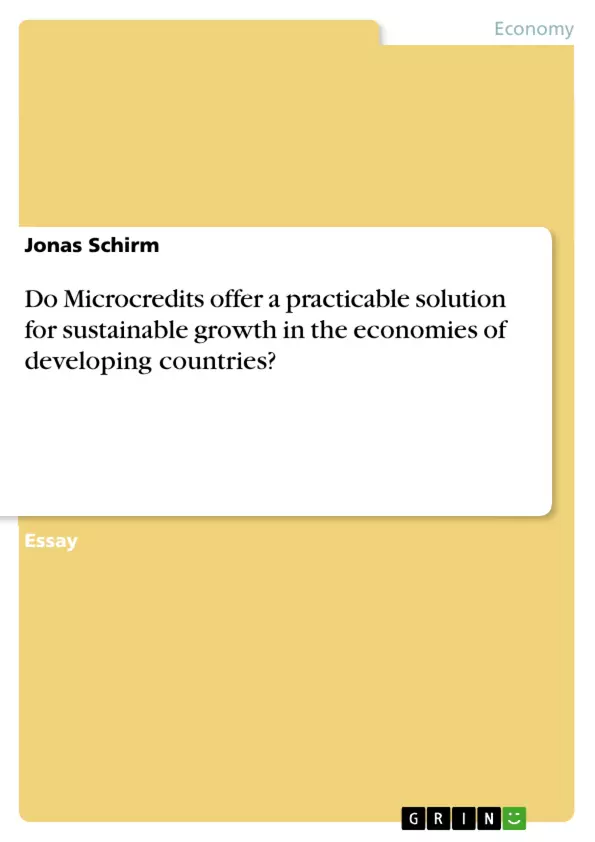The aim of this essay is to present the purpose and exigency of financial aid for developing countries and new approaches by which financial aid can lead to
sustainable growth. More than three-fourth of the world’s people live in
developing countries, but they enjoy only 17,3 % of the world’s income – while the richest 20% have 82,7 % of global income. (IMF 2001)The definition of Less Developed Countries (LDC) is not very precise. The common approach to define a country as LCD is in regarding the economy. A big part of the economic issues are a result of low creation of value (productivity).
Due to major parts of inhabitants of LDC being employed in the primary sector,
in which economically very little value can be created. The exports are basically generated by the primary sector (i.e. agricultural goods or natural resources). The strong commercial adjustment to industrialised countries has, among of others, its routs in colonialism. Most aid is regulated by the United Nations (UN) which is a world council of different nations. The UN also differs between LCD and LLCD (Least Developed Countries) which are a group of countries within the United Nations Organisation (UNO) which are ever poorer than LCD. Due to relatively unsuccessful efforts to reduce poverty in the past a new idea came up. Unfortunately there is no measurement like return on investment at aid. This essay will show were the problems are and what is done to solve them more sustainable than in the past. One new approach is the usage of Microcredits which I will give details about after explaining the initial position of the problem.
Inhaltsverzeichnis (Table of Contents)
- Characterisation of the Problem
- Do not measure a country by its income alone
- Growth vs. Development
- Governmental Options to form a Generative Economical Environment
- Monetary Policy
- Role of Central Banks
- Exchange Rates
- Microcredits
- Origin and Development
- Function
- Micro Financial Establishments
- Downsides of Microcredits
- Summary
Zielsetzung und Themenschwerpunkte (Objectives and Key Themes)
This assignment investigates the potential of microcredits as a solution for sustainable growth in developing countries. It explores the limitations of traditional economic indicators like income and analyzes the concept of development beyond mere economic growth. The assignment examines government roles in fostering a conducive economic environment, focusing on monetary policy, central banks, and exchange rates.
- The limitations of traditional economic indicators in measuring development
- The importance of sustainable growth in developing countries
- The role of government in fostering economic development
- The potential and limitations of microcredits as a tool for sustainable growth
- The challenges and complexities of promoting development in developing countries
Zusammenfassung der Kapitel (Chapter Summaries)
- Characterisation of the Problem: This chapter critiques traditional economic indicators like income as inadequate measures of a nation's well-being. It contrasts the concepts of economic growth and development, highlighting the importance of sustainable and inclusive development for developing countries.
- Governmental Options to form a Generative Economical Environment: This chapter examines the role of government policies in fostering a supportive economic environment. It analyzes the impact of monetary policy, the functions of central banks, and the role of exchange rates in promoting sustainable economic growth.
- Microcredits: This chapter delves into the origin and development of microcredits. It explores their functioning, analyzes the various institutions involved in microfinance, and investigates the potential downsides of microcredit programs.
Schlüsselwörter (Keywords)
Key terms and concepts explored in this assignment include microcredits, sustainable growth, economic development, monetary policy, central banks, exchange rates, developing countries, and inclusive development. The work also touches upon the limitations of traditional economic indicators and the need for holistic approaches to development.
Frequently Asked Questions
Are microcredits a solution for sustainable growth in developing countries?
The essay explores microcredits as a new approach to financial aid, analyzing whether they can foster productivity and sustainable economic development more effectively than traditional aid.
What is the difference between economic growth and development?
While growth refers to an increase in national income, development is a broader concept that includes improvements in well-being, education, and inclusive social structures.
What are the downsides of microcredit programs?
Potential downsides include high interest rates, the risk of over-indebtedness for the poor, and the fact that microcredits alone cannot solve systemic economic issues like lack of infrastructure.
How do central banks influence the economy in developing nations?
Central banks manage monetary policy and exchange rates, which are crucial for creating a stable environment for investment and generative economic growth.
What defines a "Less Developed Country" (LDC)?
LDCs are countries characterized by low productivity, a high percentage of the workforce in the primary sector (agriculture), and a strong dependence on exports of natural resources.
- Quote paper
- Honours Bachelor of Arts Business Management Jonas Schirm (Author), 2005, Do Microcredits offer a practicable solution for sustainable growth in the economies of developing countries?, Munich, GRIN Verlag, https://www.grin.com/document/52358



